Welcome to Bolsonaro’s stronghold in the south of Brazil
Of the five cities where the leader scored his highest levels of support in the first round of Brazil’s presidential election, three of them are located in the white-majority southern state of Paraná
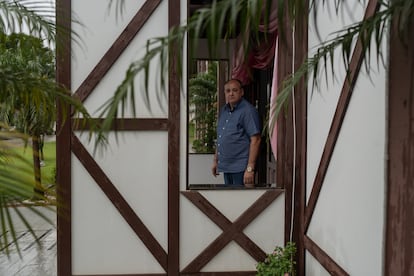

The Bolsonaro phenomenon has given 60-year-old Ivette Izabel Krüger a sense of renewal: “When I was little, the authorities here were the priest and the teacher. We respected them. I want that to come back,” she explains.
Krüger is excited to have a military man as the head of state. The mere possibility that the left will defeat the far-right Brazilian President Jair Bolsonaro in the runoff on October 30 agitates her greatly. “I would be so angry… I would even go to war to save my country.”
Krüger, a merchant, is campaigning for President Jair Bolsonaro, 67, to be re-elected. Few remain to be convinced in the town of Quatro Pontes: on October 2, during the first round, Bolsonaro won 80.3% of the vote.
Alongside the neighboring towns of Nova Santa Rosa and Mercedes – where Bolsonaro secured 82% and 78% of the first round vote respectively – this part of the southern state of Paraná is one of the Bolsonaro’s strongholds.
The towns were created a few decades ago by poor German immigrants. They were attracted by the promise of a piece of land and a better future. After years of hard work, they have done well in this fertile area, which lies near the Iguazú Falls and the borders with Paraguay and Argentina.
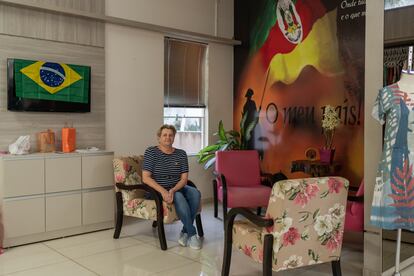
With only 4,000 residents, Quatro Pontes is a charming town. The crime rate is low, and the streets are clean. Families who live there are conservative and religious: when they host celebrations, there is no alcohol. Agriculture is the driving economic sector.
Residents of Quatro Pontes feel grateful for the socially-conservative Bolsonaro, who listens to the concerns of farmers and has boosted agricultural subsidies. They rewarded him by turning out to vote for the president on October 2, even though most polls showed him about 15 points behind 76-year-old former president Luiz Inácio Lula da Silva – popularly known as “Lula” – who is seeking a third mandate. In the end, the polls were wrong: Bolsonaro got 43% of the vote, to Lula’s 48%, forcing a runoff election.

Should Lula triumph, Bolsonaro supporters in this region mostly fear land invasions, or that parts of their property will suddenly be reserved for Indigenous Brazilians. Some also feel that, if the left returns to power, the national economy could go the way of Venezuela or Argentina.
“Look at Argentina today… when I was little, Argentine tourists came to splurge. Now, it’s the other way around. They have very high taxes, a lot of abandoned land,” says Renato Smaniotto, 39, a resident of Nova Santa Rosa. When asked if he knows anyone who supports Lula’s Workers’ Party, the agricultural entrepreneur pauses. “I don’t think so… whoever votes for the [left] here keeps quiet.”
Waldinei, a 55-year-old baker, also doesn’t know of any Lula supporters among his clientele. While he is convinced that all the political parties in Brazil are corrupt, he feels that the Workers’ Party robbed on a shameless scale when they were in power from 2003 until 2016.
“Voting for the Workers’ Party would be like telling my children, ‘you can steal, you can have an abortion.’”
While few express it openly, across the towns of Paraná, there is a sentiment of racism or classism directed at voters in northeastern Brazil. In that lower-income part of the country – where Lula has a messianic following – citizens are mostly mixed-race or Afro-Brazilian.
Milton Becker, 72, owns one of the biggest companies in Quatro Pontes: a farm with 80 employees caring for 5,000 pigs. He started his business half-a-century ago, with just 10 piglets.
“The left encourages aid without anything in return,” says the businessman. He repeats one of his candidate’s slogans: “Our economy is going to grow more than China’s thanks to the work of Bolsonaro.” In addition to praying for the president’s victory, he is looking for those who abstained from voting in the first round, to convince them to vote in the runoff election.
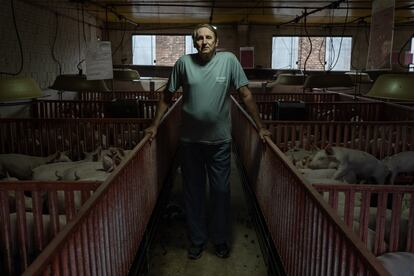
Despite the quality of life they enjoy in Quatro Pontes, the demand for labor exceeds the supply. It’s not easy to find workers.
“Here, only those who don’t want to work go hungry… there’s always work for a day laborer,” explains trucker Geraldo Schadeck, 70. “Fear is communism,” he says, as he spends the afternoon chatting at the barber shop. It’s raining buckets to the delight of many farmers, who are in the middle of soybean planting season.
These towns are free from two of the great ills of Brazil: citizen insecurity and economic inequality. All young people study in public schools, while in most parts of the country, the upper classes send their children to private academies.
Mayor João Inácio Laufer, 51, emphasizes that Bolsonaro has brought great benefits to the region: new roads, lower taxes to attract investment, and loans to buy farming equipment and industrial machinery. Soon, a nursing home is going to open. “Our people have voted for him because they see that the country is growing, even with the pandemic.”
Residents have forgiven Bolsonaro for almost all his sins, including his negligent management of the pandemic and the delay in buying vaccines. But, even among hard-core supporters, beliefs are not homogenous.
André Henrique Matos, 34, is the owner of a shooting club with almost 500 members in Cascavel, the main city in the area. He loves the Bolsonaro style: “His rude manner makes him genuine, different from all politicians,” says Matos, who abandoned the communist militancy of his youth after becoming a self-made businessman and feeling robbed about the taxes he pays. The business is now doing well, thanks to Bolsonaro’s loosening of the restrictions surrounding weapons sales.
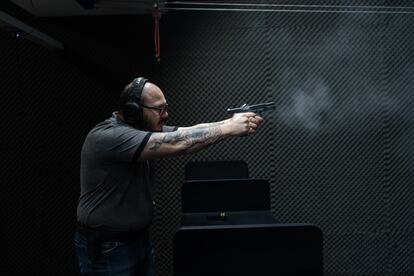
But his father – who was unvaccinated – died from Covid-19. And Matos also dislikes Bolsonaro’s tendency to mix religion with politics. One of his main discrepancies with the president is on abortion: “I’m not in favor… but I think that women should have the right to decide,” he explains in his office, before firing a few shots for the photographer.
Both gun advocates and agricultural producers consider some of the proposals outlined by Lula to be direct attacks on their interests, such as replacing shooting clubs with reading clubs, or raising export taxes on meat to increase domestic supplies and lower prices.
Back in Quatro Pontes, María (not her real name), a humble 70-year-old retiree, stands out for the brown color of her skin among the white residents. Born in Pernambuco, like Lula, she has lived in Quatro Pontes for three decades.
“Lula made things a lot better for the poor in the past… but now, I don’t know what he’s going to do. Bolsonaro is honest, you don’t hear anything bad about him. And he’s a Christian.”
Like her neighbors, in three weeks, she will cast her vote in favor of the president’s re-election.
“If Lula wins, it will be the will of God,” she smiles, before waving goodbye in the rain.
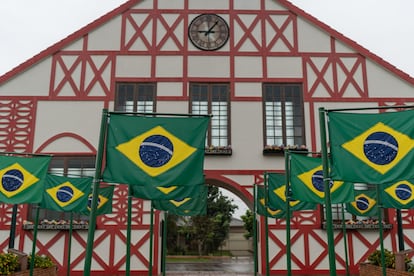
Translated by Avik Jain Chatlani.
Tu suscripción se está usando en otro dispositivo
¿Quieres añadir otro usuario a tu suscripción?
Si continúas leyendo en este dispositivo, no se podrá leer en el otro.
FlechaTu suscripción se está usando en otro dispositivo y solo puedes acceder a EL PAÍS desde un dispositivo a la vez.
Si quieres compartir tu cuenta, cambia tu suscripción a la modalidad Premium, así podrás añadir otro usuario. Cada uno accederá con su propia cuenta de email, lo que os permitirá personalizar vuestra experiencia en EL PAÍS.
¿Tienes una suscripción de empresa? Accede aquí para contratar más cuentas.
En el caso de no saber quién está usando tu cuenta, te recomendamos cambiar tu contraseña aquí.
Si decides continuar compartiendo tu cuenta, este mensaje se mostrará en tu dispositivo y en el de la otra persona que está usando tu cuenta de forma indefinida, afectando a tu experiencia de lectura. Puedes consultar aquí los términos y condiciones de la suscripción digital.








































